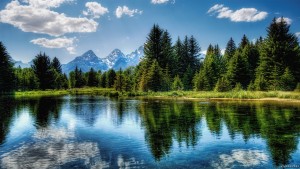 C. S. Lewis, in a number of his works, both books and essays, comments on the nature of Nature. Some people, he says, think that Nature is all there is, and that we simply spring out of this mechanistic, impersonal “thing.” Yet, as he reminds his readers continually, how can one even trust that conclusion if one’s own reasoning ability comes from this mechanistic, impersonal source? In an essay called “On Living in an Atomic Age,” he writes,
C. S. Lewis, in a number of his works, both books and essays, comments on the nature of Nature. Some people, he says, think that Nature is all there is, and that we simply spring out of this mechanistic, impersonal “thing.” Yet, as he reminds his readers continually, how can one even trust that conclusion if one’s own reasoning ability comes from this mechanistic, impersonal source? In an essay called “On Living in an Atomic Age,” he writes,
If Nature when fully known seems to teach us (that is, if the sciences teach us) that our own minds are chance arrangements of atoms, then there must have been some mistake; for if that were so, then the sciences themselves would be chance arrangements of atoms and we should have no reason for believing in them.
Why trust what science (both real and pseudo) tells us if there is no basis for trusting one’s own reasoning? After all, if there is no Intelligence behind our existence, what can we really know for sure? He continues,
There is only one way to avoid this deadlock. We must go back to a much earlier view. We must simply accept it that we are spirits, free and rational beings, at present inhabiting an irrational universe, and must draw the conclusion that we are not derived from it. We are strangers here. We come from somewhere else.
No matter how much “at home” we may think we are in the world around us, there is this nagging feeling, this sensation, that this is really quite temporary, and that our place in it is only a passing stage of what we call “life”:
Nature is not the only thing that exists. There is “another world,” and that is where we come from. And that explains why we do not feel at home here. A fish feels at home in the water. If we “belonged here” we should feel at home here. All that we say about “Nature red in tooth and claw,” about death and time and mutability, all our half-amused, half-bashful attitude to our own bodies, is quite inexplicable on the theory that we are simply natural creatures.
Even as he stated in his autobiography, Surprised by Joy, and repeated in Mere Christianity, how, if there is nothing outside of Nature, can we have any idea of right and wrong? “If there is no straight line elsewhere,” Lewis notes, “how did we discover that Nature’s line is crooked?”
So what is the real nature of this Nature that surrounds us? He concludes,
What, then, is Nature, and how do we come to be imprisoned in a system so alien to us? Oddly enough, the question becomes much less sinister the moment one realizes that Nature is not all. Mistaken for our mother, she is terrifying and even abominable. But if she is only our sister—if she and we have a common Creator—if she is our sparring partner—then the situation is quite tolerable.
Nature is not our enemy; Nature is not our source of anything; Nature is merely the creation of God as much as we are. We are in this together.
